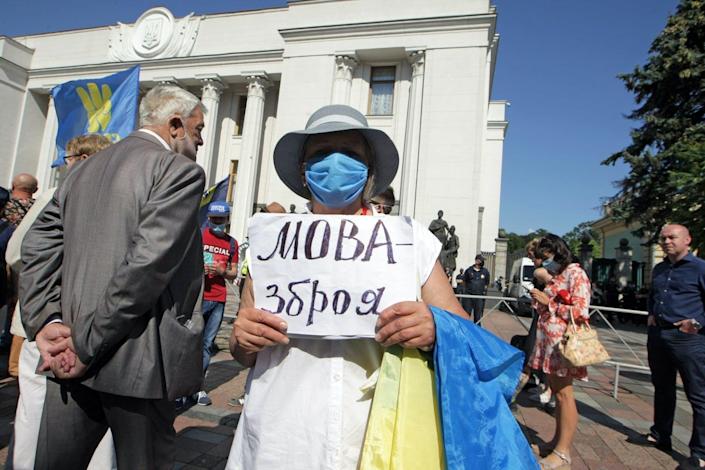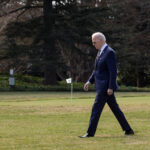What does the Russian invasion of Ukraine have to do with language?
If you ask Russian leader Vladimir Putin, Ukrainian governmental policies promoting the use of the Ukrainian language are evidence of the “genocide” of ethnic Russians in the Russian-speaking east, and thus provide part of the rationale for invasion.
Propaganda like that aside, something else links war to language: power.
Long before shots were fired, a power struggle has played out in the region around language – specifically, whether or not Ukrainian is a language. Neither professional linguists nor Ukrainians have any problem thinking of Ukrainian as a separate language – it’s probably about as different from Russian as Spanish is from Portuguese. Yet Russian nationalists long sought to classify it as a dialect of Russian.
Russia’s status as a power language
It turns out that classifying a given language variety as “a language” is less clear than you might think, and popular understandings of “language” versus “dialect” are usually based more on political criteria than linguistic ones. As sociolinguist Max Weinreich succinctly put it, “a language is a dialect with an army and a navy.”
Russian, the language of Tolstoy and Dostoyevsky, is one of the world’s handful of power languages. Alongside languages such as Mandarin, Spanish and English, Russian is deeply intertwined with global politics, business and pop culture.
Of Russian’s 260 million speakers, roughly 40% – 103 million – speak it as a second language, a sign that people see value in learning it. It’s a lingua franca across Central Asia and the Caucasus, and is widely spoken in the Baltics. In Ukraine – Russia’s largest European neighbor – Russian is used by about one-third of the population, which is around 13 million people. “Number of speakers” isn’t the defining feature of a power language, however – Bengali, for example, has 265 million speakers – more than Russian – but for the most part people aren’t clamoring to learn it.
Russian, on the other hand, is unique among the Slavic languages in that it is taught in the most prestigious universities across Europe, Asia and the United States. With all those speakers, all that clout, and all that cultural production, Russian’s status as a power language looks as natural as beets in borscht.
But it’s not.
Power languages derive their status not from anything inherent to the linguistic system, but instead from the historical arrangements of power that give their speakers – and culture – perceived status and value.
Russian picked up speakers – and knocked out other languages – through its remarkable history of expansionism: The Muscovites, inhabitants of the Grand Duchy of Moscow that predated the Russian Empire, moved to the east and the north, taking over Kazan and Siberia during the 16th century. By the end of the 19th century, the Russians had conquered Central Asia, all the way to the border of China. Following World War II, the Soviet Union extended its sphere of influence into Eastern Europe.
Ukraine became a part of the Soviet Union in 1922. In 1991, it gained its independence, when the Soviet Union broke apart.
Although nobody knows for certain, it appears Putin is seeking to make all or portions of Ukraine once again part of Russia.
Two twigs on the same linguistic branch
So if Russian is a “power language,” what is Ukrainian?
If you ask some Russian nationalists, Ukrainian isn’t a language at all. In 1863, Russian Minister of the Interior Pyotr Valuev declared that “a separate Ukrainian language (‘Little Russian’) has never existed, does not exist, and shall not exist.” Per another quote – attributed to Tsar Nicholas II – “There is no Ukrainian language, just illiterate peasants speaking Little Russian.”


But as a matter of linguistic history, Ukrainian and Russian emerged as distinct languages from a common source language spoken around A.D. 500 that linguists refer to as “proto-Slavic.”
The Slavic languages share more than grammatical and phonological linguistic similarities. They also have a common homeland, and that homeland was, most likely, western Ukraine.
For reasons that linguists, archaeologists and other scholars still debate, speakers of proto-Slavic fanned out from their homeland, moving northward, westward and southward.
As they moved, proto-Slavic gradually gave rise to the language varieties that would eventually become the contemporary Slavic languages, which include Polish, Serbian, Russian and Ukrainian. By the 9th century, some Slavs who stayed close to home linked with the Rus – a group who were either Slavs themselves or assimilated Scandinavians – and created the first noteworthy East Slavic federation known as Kyivan Rus, situated, as the name suggests, in Kyiv. Kyivan Rus can be thought of as the predecessor to the modern Ukrainian, Belorussian and Russian nations.
Resisting Russian
Since language has become so key to national identity, it’s no wonder that reframing Ukrainian as a dialect of Russian is integral to Putin’s discursive campaign, just as it was for Tsar Nicholas II 200 years ago. Part of holding power, it turns out, is the ability to frame the discourse, and the title of Putin’s essay, “On the Historical Unity of Russians and Ukrainians,” which he published in July 2021, leaves little doubt as to his position. If all things Ukrainian – including the language – are simply derivatives of all things Russian, the invasion looks less like an act of aggression and more like reintegration.
Ukrainians, of course, bristle with this characterization, not because there is no Russian being spoken in Ukraine – Volodymyr Zelenskyy is himself a Russian speaker – but because for many, Ukrainian identity involves bilingualism. Many Ukrainians speak both Ukrainian and Russian and even mix them in a form people call “surzhyk” – the Eastern Slavic version of “Spanglish.”
In Ukrainian public life, fears over the primacy of Russian or Ukrainian have led to conflict before. In 2020 there were heated debates and protests over a bill that would have repealed a stipulation requiring that 80% of schooling occur in Ukrainian. There was a brawl in 2012 in the Ukrainian Parliament over a bill that would have made Russian an official language, alongside Ukrainian, in parts of the country.


More recently, reports show that in eastern Ukraine, some Russian-speaking Ukrainians are abandoning Russian to avoid using “the language of the occupier.”
Of course, speakers all over the world give up their mother tongues in favor of languages they perceive to be more valuable all the time, but usually this happens gradually, and in the direction of power languages. Except under circumstances of extreme duress – an outside invader or forced submission by a dominant group – it’s somewhat unusual for speakers to abandon their mother tongue overnight.
[The Conversation’s Politics + Society editors pick need-to-know stories. Sign up for Politics Weekly.]
In El Salvador, speakers of Lenca and Cacapoera did this in the 1930s to avoid being killed by Spanish-speaking Salvadoran troops. But in Ukraine, some speakers aren’t adopting the language of the invader; they’re giving it up.
Putin’s attack will almost certainly accelerate that trend. While Russian’s status as a power language probably will not be affected, it may start to shed speakers. And with all the attention on Ukraine, perhaps the world will come to appreciate it as the Slavic homeland where people seem to prefer to speak Ukrainian – not Russian.
This article is republished from The Conversation, a nonprofit news site dedicated to sharing ideas from academic experts. It was written by: Phillip M. Carter, Florida International University.
Read more:
Phillip M. Carter does not work for, consult, own shares in or receive funding from any company or organization that would benefit from this article, and has disclosed no relevant affiliations beyond their academic appointment.




